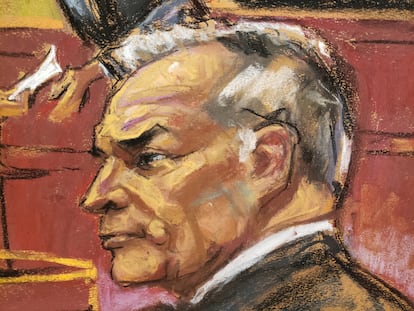The US stirs up the hornet’s nest of drug trafficking in Mexico
Prosecutors are seeking life imprisonment for former Mexican drug czar Genaro García Luna, hours after Mexico’s president said Washington is ‘ jointly responsible’ for the violence that has broken out in Sinaloa

All the latest news involving Mexico’s narcos are taking place in the United States. The Attorney General’s Office for the Eastern District of New York on Thursday asked that Genaro García Luna, who served as Mexico’s drug czar from 2006 to 2012 but was convicted last year of taking bribes from the Sinaloa cartel, be sentenced to life behind bars and pay $5 million for engaging in a criminal drug enterprise, taking part in various conspiracies and making false statements. His sentence is due to be announced on October 9 in a Brooklyn federal court. Meanwhile, Ismael El Mayo Zambada is expected to appear in that same court and before the same judge three weeks later, on October 31. And 300 kilometers to the south, in Washington, a jury is already deliberating on the verdict of Rubén Oseguera El Menchito, son of Nemesio Oseguera El Mencho, the leader of the Jalisco New Generation Cartel. And before the end of this month, Ovidio Guzmán, son of El Chapo, has a date in court in Chicago, after weeks of speculation about his whereabouts.
While the judicial offensive advances on several fronts in U.S. territory, the Mexican state of Sinaloa has been burning for 10 days, caught up in the worst cartel war in more than a decade. President Andrés Manuel López Obrador said that the U.S. is “jointly responsible” for the wave of violence that is ravaging the state, a historic bastion of the Sinaloa Cartel, for taking its attempts to capture El Mayo to the bitter end.
“It is difficult to overstate the magnitude of the defendant’s crimes, the deaths and addiction he facilitated, and his betrayal of the people of Mexico and the United States. His crimes demand justice,” wrote prosecutors in the case against García Luna, former Secretary of Public Security and the architect of the war on drugs. “This week, Luna’s lawyers made public a letter accusing President López Obrador of having ties to the Sinaloa Cartel and pushing through his judicial reform to “benefit criminals.” García Luna also revealed that U.S. authorities offered him a reduced sentence in exchange for revealing information about other Mexican politicians and businessmen, which has reignited the debate about a possible negotiation after his sentencing.
López Obrador said that the former official’s letter, his first public statement in his own handwriting since he was found guilty in February of last year, is a sign of “desperation” and demanded that he present evidence to support the accusations against him. The confrontation between the president and the former government official was reactivated as the date of sentencing approaches, with an exchange of statements that took García Luna’s defense by surprise. His lawyers have announced that they will appeal the sentence, which will be a minimum of 20 years in prison.
The fall of García Luna, the highest-ranking former Mexican official to ever set foot in a U.S. court, has drawn attention for its symbolism, but it is not the issue that most worries the López Obrador administration. The unexpected capture of El Mayo on July 25 in New Mexico continues to make waves south of the border, with an open confrontation between Zambada’s people and Los Chapitos for control of the Sinaloa Cartel that has sown chaos in Culiacán and other surrounding municipalities. Around 50 people have been killed in the last two weeks and dozens more have been arrested, injured and gone missing, according to official figures. Revenge for the betrayal that led to the arrest of the 76-year-old boss came five weeks late and now no one, neither authorities nor analysts nor residents, dares to offer a forecast of when the violence will end.
The president refuses to acknowledge the extent of the latest fracture of the Sinaloa Cartel, but the terror that reigns in the state has led him to air the biggest claim he has made to date against the U.S. government since the capture of El Mayo. “An explanation is required, because if we are now facing a situation of instability and confrontation in Sinaloa, it is because they made that decision, and we do not agree that Mexico should be ignored because we have the problem here,” said the president. “It was totally illegal,” said the president about the arrest of Zambada. “How does it help to stop the drug addiction problem in the United States?” he questioned about Washington’s strategy against the leaders of the cartels, which has failed to stop drug flows for decades. “How is it that we never know about famous cartels and bosses in the United States?”
López Obrador also questioned the plea deals the United States has promoted to bring down big bosses. The trial against El Menchito has been a parade of former allies and enemies ready to testify about his meteoric rise in the Jalisco Cartel, his corrupt dealings to avoid the law and his extensive record in the shadow of his father, despite the fact that he is only 34 years old. The trial against García Luna saw almost 30 witnesses take the stand, including more than a dozen convicted criminals. Mexico’s eyes are now on Ovidio Guzmán and his brother Joaquín Guzmán López, who established contacts for years with different U.S. agencies to negotiate a surrender and are the main suspects of orchestrating El Mayo’s handover, according to Mexican authorities. “They made a deal and they didn’t inform us,” the president said, stressing that the United States has not been transparent about Zambada’s arrest.
The latest controversy aside, the underlying question is whether both countries have the capacity to maintain a common agenda against organized crime. The López Obrador administration has pushed for equal treatment and an admission of co-responsibility in the drug trafficking phenomenon. The Joe Biden administration has conceded the former, understanding the need to have Mexico as an ally to contain migration and drug trafficking, but the predominant focus in the war on drugs continues to base its most visible efforts on ending supply, with virtually no mention of demand. Meanwhile, the fentanyl epidemic claims tens of thousands of American lives every year.
“We are also interested in keeping fentanyl from reaching the United States, but the United States has to do its part, we have to do our part in our country, and coordinate, collaborate,” said Claudia Sheinbaum, the president-elect. The latest disagreement between the two countries comes less than two weeks before the transfer of power in Mexico and a month and a half before Americans go to the polls. And the race between Kamala Harris and Donald Trump will be decisive: it could mean the difference between more heavy-handed policies that stir up trouble again, or efforts to repair the channels that have been broken and make a last attempt at collaboration. Meanwhile, Sinaloa is holding its breath.
Sign up for our weekly newsletter to get more English-language news coverage from EL PAÍS USA Edition
Tu suscripción se está usando en otro dispositivo
¿Quieres añadir otro usuario a tu suscripción?
Si continúas leyendo en este dispositivo, no se podrá leer en el otro.
FlechaTu suscripción se está usando en otro dispositivo y solo puedes acceder a EL PAÍS desde un dispositivo a la vez.
Si quieres compartir tu cuenta, cambia tu suscripción a la modalidad Premium, así podrás añadir otro usuario. Cada uno accederá con su propia cuenta de email, lo que os permitirá personalizar vuestra experiencia en EL PAÍS.
¿Tienes una suscripción de empresa? Accede aquí para contratar más cuentas.
En el caso de no saber quién está usando tu cuenta, te recomendamos cambiar tu contraseña aquí.
Si decides continuar compartiendo tu cuenta, este mensaje se mostrará en tu dispositivo y en el de la otra persona que está usando tu cuenta de forma indefinida, afectando a tu experiencia de lectura. Puedes consultar aquí los términos y condiciones de la suscripción digital.









































